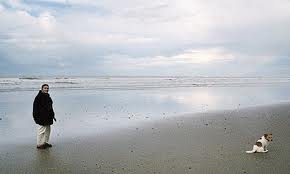I'm currently in cinema catch-up mode, although this is beginning to feel like a constant state of being. Still, this past week or so has been a decent attempt at getting back into the race, having viewed three 2010 flicks, The Black Swan, Inside Job, and Exit Through The Gift Shop. Quick rocket-fire reviews at the ready!
THE BLACK SWAN (Darren Aronofsky; USA; 2010)
I am at a total loss as to how this film has garnered the critical attention it has. This is, as has no doubt been stated before, some kind of mutated distant relative to Powell & Pressburger's 1948 classic The Red Shoes, and the story of a tortured fragile female performer going mad through utter immersion into a role feels overdone and hackneyed. Sure, its visually compelling, with the fracturing of Natalie Portman's psyche yielding occasionally disquieting and eerie moments, but this is essentially a bit of a perv-fest. My partner kinda hit it on the head after we saw the film together.
I asked her what she thought, and she replied “well, you can tell it was written and directed by men.” And with that idea in the head, one can't help but start to make up the conversations going on during the creation of this film. 'Hey, let's get Natalie to masturbate.' 'Hey, let's get her to have some full-on hot lesbo rumpy-pumpy with Mila Kunis.' Give. Me. A. Break.
INSIDE JOB (Charles Ferguson; USA; 2010)
You can trust a name like Charles Ferguson. It sounds so avuncular. Or professorial. A name clothed in a tweed jacket. With elbow patches.
And trust this film I did, because it takes away the 'documentarian-as-personality' effect that Michael Moore eventually bored us to tears with, and leaves us with a chaptered narrative that deftly spells out just what the fuck the global financial crisis (or the GFC, for all the cool abbreviationists out there) was all about. Evokes the kind of “bloody hell!”, “well I never”, and “grrrr” responses that were evoked by other white-collar dirty-rotten-scoundrel docos, like Enron: The Smartest Guys in the Room and The Corporation. There's only one slight hurdle with this kind of film though – it's so super-densely packed with information that it's easy to leave the theatre with your head on fire, trying to remember all the pieces of the story. Still, only a minor hurdle, that head-on-fire sensation.
EXIT THROUGH THE GIFT SHOP (Banksy; UK; USA; 2010)
It's kind of boring to dwell on whether the film is a hoax or whether it's 'real', and I'm presuming that this line of enquiry has already been speculated to death. Watching the slow exchange of roles, as film-maker becomes street artist and street artist becomes filmmaker, is both remarkable and hilarious. Watching the arc of transformation of the obsessive amateur filmmaker Thierry Guetta is both wince-inducing AND jaw-dropping in the same moment. If Thierry Guetta/ Mr Brainwash is the real deal, then seeing him unintentionally out-prank the arch-prankster Banksy himself has to be the funniest thing I've seen in ages.
Ultimately the film is most interesting for its active interrogation of authorship, the recording of memory, and the intense and almost tragic desire to never forget. But sometimes it's so important to forget. Just like I've forgotten that film I just saw, what was it again, The Black Pigeon? The Slack Swan? Aronofsky Flew Over The Cuckoo's Nest?




